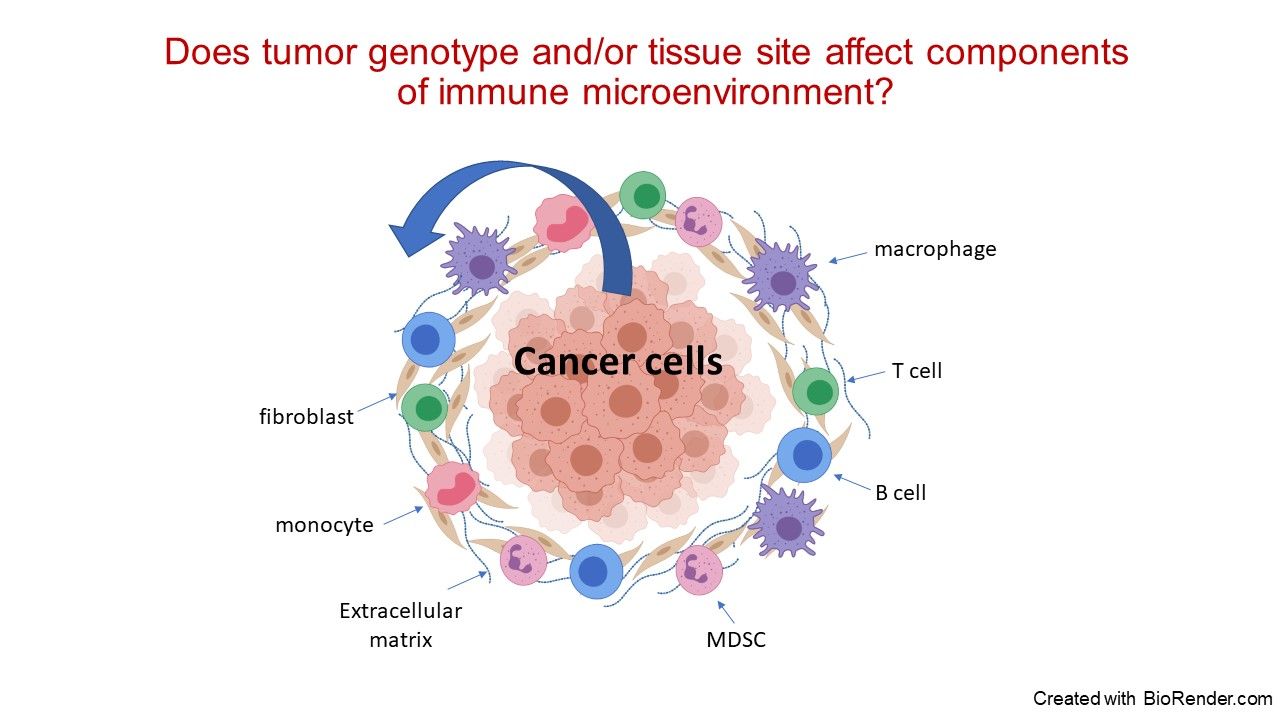
Research
Tumors are not just cancer cells, but include many other cell types, including immune cells. A tumor’s DNA makeup can profoundly influence the number and types of immune cells in the tumor microenvironment, but this association has not been well-defined in gastrointestinal cancers. We found that a tumor's genotype can influence the composition of the immune cells surrounding it, which can, in turn, affect sensitivity to cancer therapy.
Pancreatic Cancer
Pancreatic cancer is a deadly disease with very few effective treatment options. In fact, of those patients with stage IV pancreatic ductal adenocarcinoma (PDA), less than 11% survive more than five years. Immunotherapy is an exciting new therapy for cancer patients, but it has limited efficacy in PDA. Understanding why PDA tumors are resistant to immunotherapy will increase sensitivity to current treatments, improving patient outcomes.
We are investigating how mutational variation in pancreatic tumors contributes to therapy resistance. Although tumor genotype is not currently utilized for selecting patients for immunotherapy (apart from the 1% of PDA patients who are MSI high), we aim to provide preclinical evidence for patient stratification in clinical trials based on tumor genotype and/or immunophenotype. Our goal is to inform the development of personalized medicine regimens!
Colorectal Cancer
Colorectal cancer is the third most common cancer affecting both males and females in the United States. Although we have identified many of the genetic and environmental changes that contribute to the development of colon cancers, we still have very few effective treatment options. Understanding how tumor mutations and their surrounding cells cause tumor development is essential for the creating better drug therapy. Several differences can be seen in the colon cancers that begin on the left side, in the descending and sigmoid parts of the colon, compared to those that occur on the right side, in the ascending and cecum portions of the colon. The differences between left-sided and right-sided colon cancers include why and how the cancer developed, and the cancer’s aggressiveness and how well it responds to usual chemotherapy regimens. We are using a unique set of tools to address these fundamental problems, including 3D organ-like cultures (organoids) isolated from mouse colon.
Figure 1.

Current Projects:
- Tumor Immunology
- CRISPR/Cas9 gene editing
- Pancreatic Cancer
- Colon Cancer
Bio
Dr. Despina Siolas attended medical school at Stony Brook University, where she was awarded the prestigious E-Trade Financial Scholarship from the Hellenic Medical Society of New York. Dr. Siolas is the recipient of a Doctor of Philosophy in Genetics from Stony Brook University for studies she conducted in the lab of Greg Hannon PhD, Howard Hughes Medical Institute Professor, at Cold Spring Harbor Laboratory. She completed her internal medicine residency and hematology/oncology fellowship at NYU Langone Health. She has received a prestigious Mentored Clinical Scientist Research Career Development Award (K08) from the National Institute of Health as well as a Dept of Defense Pancreatic Research Program Idea Development Award.
Distinctions:
- Young Leaders Advisory Council, National Pancreas Foundation
- Pancreatic Cancer Subcommittee, Alliance for Clinical Trials in Oncology
- Co-Founder, Weill Cornell Medicine Hematology/Oncology Women Physicians Group
- Postdoctoral Research Symposium Presentation Winner, NYU Langone Health, 2020
- NIH Mentored Clinical Scientist Research Career Development Award (K08)
- Rising Star in Oncology, Society for Translational Oncology
- Women in Cancer Research Brigid Leventhal Scholar Award, AACR
- AMA Foundation Leadership Award Winner, American Medical Association
